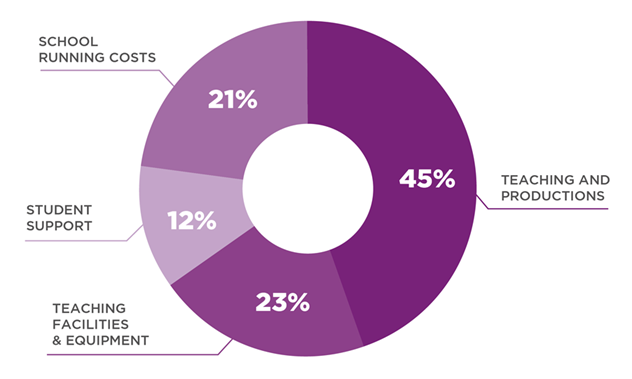Value For Money
At the National Film and Television School we offer practical, hands-on teaching from industry professionals, using professional film and TV stages and high-quality equipment, enabling our students to make high-quality films, television shows, games and other projects. The School meets all production costs, and our students win awards and compete at festivals around the world. Our 38-week teaching year and our intensive approach to teaching and learning means Master's and Diploma students get far more tuition time than the vast majority of postgraduate institutions offer.
All NFTS students have access to our Masterclasses programme of high profile speakers from across the film, television and games industries and many of our Master's and Diploma courses include work placements at prominent industry companies. Our Bridges to Industry programme also gives some students the opportunity to work on extracurricular projects with commercial partners.
We are the only UK film School that consistently appears in the global Hollywood Reporter listing of the top 20 International Film Schools.
Content Tabs
At the NFTS, we manage our finances carefully, led by our Directorate team and supervised by our Governing Board. We look to focus as much of our resources as possible directly on your learning experience, through dedicated, full time tutorial staff, complemented by industry visiting tutors, practical workshops and productions, delivered using the latest specialist equipment and technical support. We are a not-for-profit organisation, but look to generate a small surplus each year to reinvest in the School and preserve its long-term sustainability.
We aim to be transparent about our expenditure and show how you derive value from the fees you pay to us, as we set out later. The direct cost of your tuition includes the full cost of all student productions, along with access to industry professionals, visiting tutors and guest speakers of the highest calibre. We help you to deliver your vision and the story you want to tell or to develop the technical skills in which you want to excel. Over the last 12 months, notable visitors have included: Screenwriters Eric Roth, Jesse Armstrong, Daniel Lawrence Taylor, and Sally Wainwright; Executives Sara Putt, Stephen Lambert, and Charlotte Moore; Directors David Fincher, Sam Mendes, Emerald Fennell, Gareth Edwards, Nia DaCosta, Alex Garland, Anthony Chen, Dominic Savage, Jessica Hobbs, Nida Manzoor, and Rose Glass; Composer Natalie Holt; Editors Walter Murch, Kirk Baxter, Jennifer Lame, and Paulo Pandolpho; Games Design & Development Rafif Kalantan; Costume Design Sandy Powell; Animation writing/producing/directing John O’Farrell, Juan Pablo Reyes Lancaster Jones & Peter Del Vecho, and Jim Capobianco; TV Comedy Ash Atalla; Cinematography Roger Deakins and Diana Olifirova; Actor Stephen Graham; and most recently the legendary Director Francis Ford Coppola to name a few.
Our close relationship with industry ensures that you have the opportunity to work directly with prospective employers in the sector, in the booming creative industries. Our graduates are eminently employable, with over 90% of our students annually securing graduate-level jobs within 6 months of leaving the School.
Further, we are proud of the skills and ambition of our students, actively promoting their films, productions and games, which is reflected in our unprecedented success at student awards including BAFTAs, BIFA, RTS, CILECT and the Oscars.
At the 2024 BAFTAs, the School won Best Short Animation for student film Crab Day and Best Short Film for student fiction film Jellyfish and Lobster. Also, Shirley O’Connor, a producing graduate, won Best Debut for Earth Mama and Tarn Willers won Best Sound for The Zone of Interest.
The School is quite different to many other Higher Education Institutions, which are primarily funded by student fees. The NFTS secures funding from a multitude of sources including Industry, Government and Philanthropy. These additional monies, which account for more than half of the School’s funding, supplement the fees you pay to the School, as illustrated:
Chart source: NFTS financial statements year ended 31 July 2024
Your tuition fees cover approximately two-thirds of the direct cost of your course. The balance is made up from funding from government, industry and philanthropic donations, reflecting their investment in you as the next generation of film, television and games makers.
All of the School’s money either directly or indirectly goes into supporting and delivering your learning experience. Two-thirds of the School’s costs are directly focused on delivering your course to you. The costs of tuition, workshops and the film, television and games productions that the School makes and which you have the opportunity to work on represents 45% of the School’s costs; when combined with the cost of facilities & equipment, this figure rises to 68% of the School’s costs.
Chart source: NFTS financial statements year ended 31 July 2024
As part of the curriculum, many of you will work on productions which encompass all elements of the production process, from development through to production, post production and delivery; working alongside students and industry professionals across all crew roles: cinematographers, editors, sound designers, composers, construction, and visual effects, to name a few. Our industry professionals are of the highest calibre, providing hands-on, individualised tuition that will help you tell the story you want to tell and excel in your chosen specialism or skill.
We offer targeted scholarships and bursaries to ensure that ‘financial means is not a barrier for talent’. These, along with the other student support services and facilities such as student welfare support, library facilities and the Registry team make up over 12% of the School’s annual budget.
Finally, the School ensures it operates as effectively and efficiently as possible, investing in high calibre staff to deliver our support functions such as Finance, HR, Marketing and Fundraising. Approximately 21% of the School’s finances are spent on these areas.
The School consciously keeps its class sizes small, with cohorts on most courses numbering between 10 to 16 students. This enables a more intensive approach to teaching and learning contact time.
The skills and experience gained by the School’s students continues to be recognised by industry, with over 90% of the School’s students securing graduate level jobs within 6 months of graduation. The School’s Ready for Work programme prepares all graduating students to enter the market place with confidence, ably supported by the School’s Talent and Alumni Manager who provides advice and assistance to students as they begin to look for work in the industry.
The School recognises that studying at the School is a huge commitment, both in time and financially, which has been exacerbated in recent years by the cost of living crisis. The School is doing all it can to alleviate some of this pain including: providing free breakfast to all students; subsidising the cost of meals at the School’s restaurant and café; making free sanitary products available; making printing facilities free of charge and providing greater financial assistance to students facing unexpected costs.
Student mental health continues to be a priority for the School. The School has a team of three Wellbeing advisers with significant experience in the HE sector, and provide students access to professional counsellors as well as a 24/7 counselling advice service. Wellbeing workshops were embedded into the curriculum for some courses as a pilot in 2024 and will be across the curriculum over 2025. Events and activities that promote good physical and mental wellbeing are also regularly scheduled.
Finally, the School has an active Student Union who support and deliver a range of social and cultural events recognising the increasing diversity of the student body, and they have facilitated a wider number of clubs and societies being set up and run by students. In 2024, the Student Union appointed dedicated student representatives to support students from LGBTQIA+, Ethnically Diverse, Disabled and International backgrounds.
The School is not-for-profit. We balance what we expect to spend in a year, plus contingencies for unforeseen costs, to generate a small surplus so that we continue to invest in the School, its facilities and equipment.
Annually we invest more than £1 million in upgrading our equipment and infrastructure to keep pace with technological advances. This includes regular investment in new cameras, sound equipment and IT to meet the changing demands of industry and the curriculum, as well as maintaining the School’s buildings and infrastructure. This ensures that our students are industry-ready when they graduate, and enables us to train the film, television and games talent of the future.
We also invest further afield, recognising our responsibility to be ‘THE’ national film and television school. With hubs in Glasgow, the north of England in Leeds and a hub in Cardiff, these hubs help to ‘level-up’ these regions, enabling opportunities to a wider range of students to enter the creative industries.
In 2024, the School set up the Sean Connery Talent Lab in Edinburgh, Scotland, providing a voice and facilities for prospective Scottish filmmakers, writers and producers.


